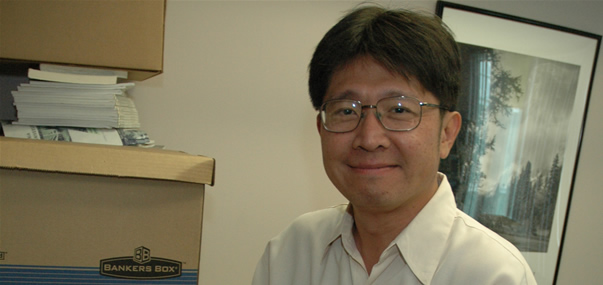Sharing American Politics
Political Science Professor Yuan Ting Prepares for Fulbright in China
December 19, 2006
By Valerie Orleans
In January, Yuan Ting, professor of political science, will travel to
Guangzhou, the capital of Guangdong Province in southern China, to spend
a semester as a Fulbright Scholar. While there, he will teach a graduate-level
seminar in public administration at South China University of Technology,
as well as give lectures to university students and government officials
throughout the region and the country.
It may be
difficult to teach students about American public administration in a country
where the political system is different, “yet it is very exciting as
China begins to modernize its government structure and becomes interested in
finding out how and why our government works the way it does,” Ting said. “What
I hope to do is share with Chinese students and government officials our successes
and failures. I want them to understand that you can learn from both good and
not-so-good experiences.”
To that
end, Ting is shipping more than 10 boxes of books, journal articles, reports,
and other teaching materials to China.
“Books
in English are very expensive there,” he said. “I want to be able
to show students that Americans often disagree on what we think the role government
should play in different policy areas. As a Fulbright Scholar, the State
Department allows me to send these boxes through its diplomatic pouch system
to support my teaching.”
Ting expects
that his Chinese students may be more passive than their American counterparts.
“The
educational system in China is quite different,” he said. “Chinese
students are taught to listen and take notes during class, and then memorize
and repeat the information back to the teacher.
“There
isn’t a culture of students actively participating in class discussions,
let alone disagreeing with their teacher. I want to encourage open discussion
and critical thinking, and at the same time I will be ready to adjust my teaching
style if necessary,” added Ting.
What the
political scientist really finds exciting is that as China gradually takes
its place as one of the world leaders, he will take a part in helping its future
leaders gain a better understanding of the principles of our democracy and
government system.
“When
you think about it, China has come a long way, especially in the last two decades” he
said. “I feel very privileged to have this opportunity to work
with these students who will become the future Chinese leaders.”
Among the
areas that Ting will focus on is how Chinese government officials respond to
the ever-changing and increasingly complicated problems brought up by economic
reforms.
“Historically,
China has been slow to change,” Ting said. “But, its leaders now
understand that changes are needed and are taking a more progressive approach
to find ways to hold government officials more accountable for actions as well
as to train them to be able to respond and adapt more quickly to the changing
society. I want to discuss the idea of accountability and how they can improve
the performance and results of government agencies. My goal is to plant a seed
with my students as they lead China into the future.”

